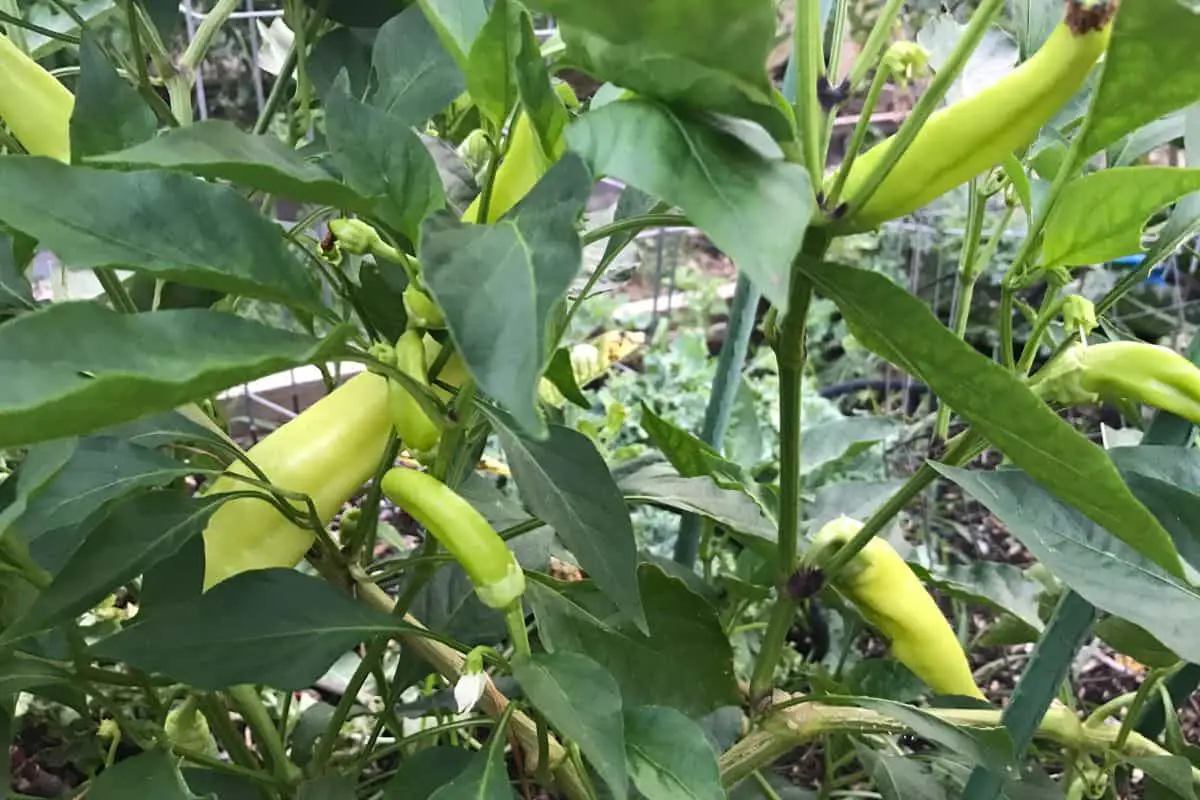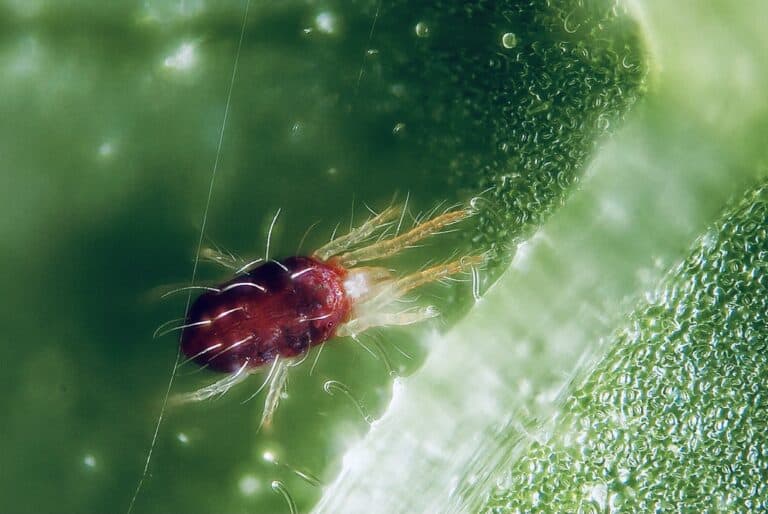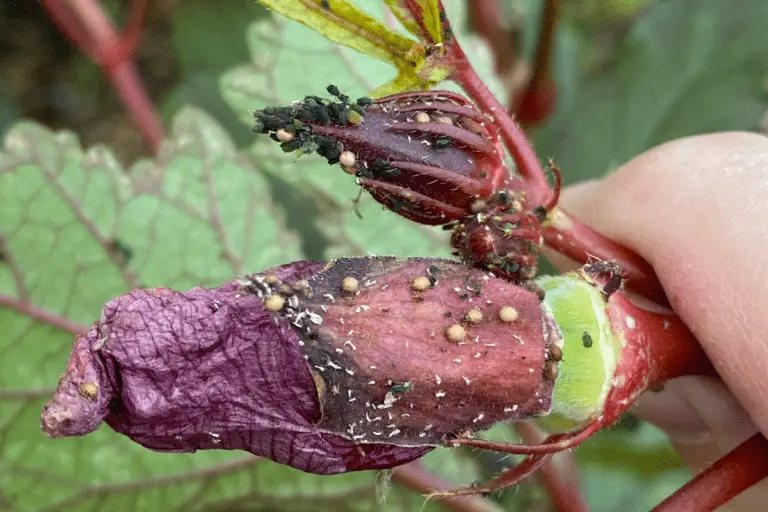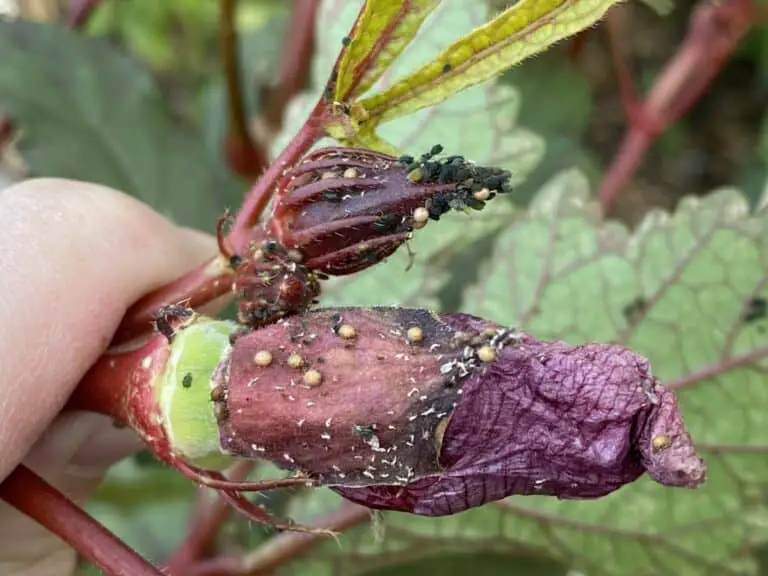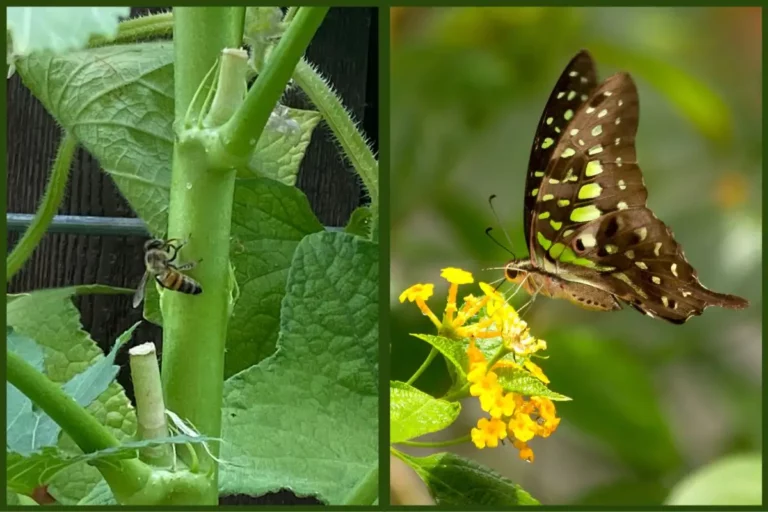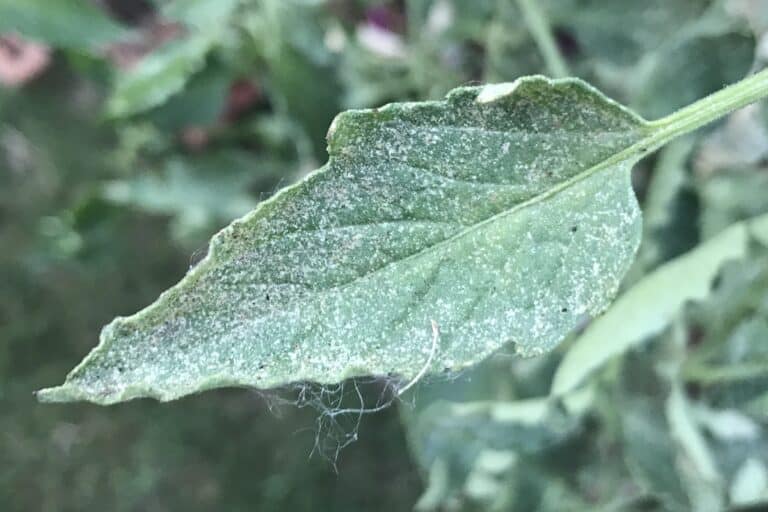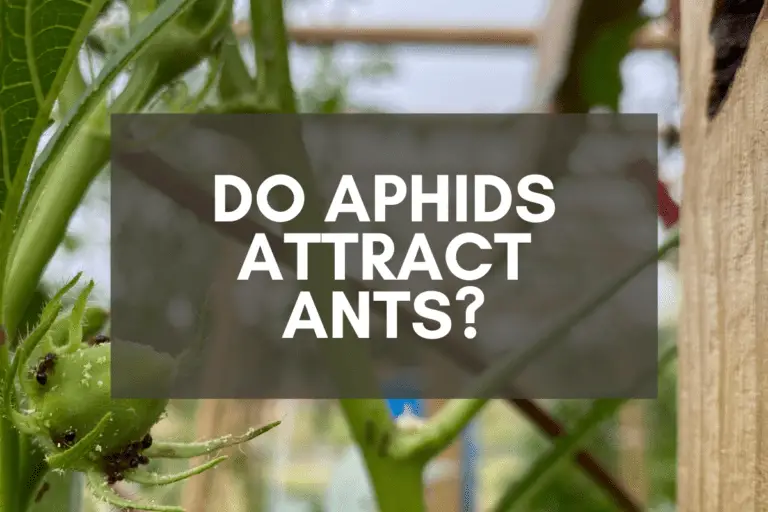10 Easy Ways to Keep Ants Off Your Pepper Plants
It was the middle of summer, and my pepper plants were robust and fruiting. I eagerly strolled to the garden with my morning cup of tea to check their progress. But as I walked closer, I could tell something was wrong. The upper branches were drooping, and the leaves were covered with little black specks.
As I got closer, I could see hundreds of ants coursing along the stems and massing at the node junctions. Oh no!
Of course, ants are commonplace in the garden. However, if you’ve ever experienced an overnight ant invasion of your pepper plants, you know how unnerving and disquieting it is. I knew I had to act fast, and I needed to deliver a decisive blow!
As a general rule, the best way to rid pepper plants of ants is to get rid of the underlying aphid infestation using natural remedies such as liquid soap or insecticidal soap sprays. Once aphids are no longer congregating on the pepper plants, the ants will go elsewhere in search of food.
While you don’t want to eliminate all the ants in your garden, action needs to be taken when the ant population gerts out of control. That means utilizing natural remedies safe for plants, pets, and humans that act quickly to safeguard your pepper plants and restore balance in the garden.
In this article, I’ll do the following:
- explain what ants do to pepper plants
- discuss why exactly ants sometimes swarm pepper plants
- provide 10 natural, easy ways to rid your pepper plants of ants
- share a few things to look for if you think you’ve got an aphid infestation
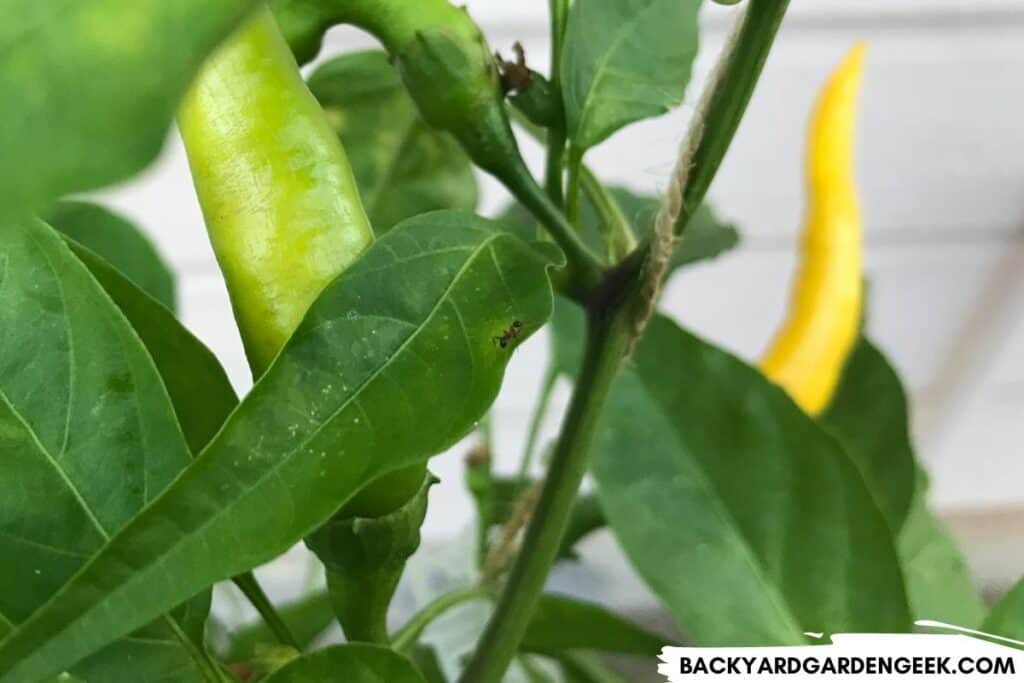
Will Ants Harm My Pepper Plants?
The answer to this question is no. But also yes (well, kind of). Here’s what I mean:
Unless you’re dealing with leafcutter ants–a relatively rare issue that most gardeners don’t need to worry about–ants found in your garden will not eat your pepper plants. Even the developing pepper fruits aren’t a food source for ants.
As their name implies, leafcutter ants will eat parts of the leaves from your pepper plant to take back to their colony, where the leaves are used to grow a fungus, which the ants then harvest to feed their larvae.
But most people don’t have leafcutter ants in their yard. I haven’t had any issues with them in the nearly 15 years I’ve gardened, so you likely don’t need to worry about such ants.
Here’s what you do need to worry about: aphids.
Aphids are drawn to the leaves, flowers, and small fruit of pepper plants. They use their piercing mouthparts to suck nutrients out of the plant.
What happens next is this: As aphids feed on your pepper plants, they’ll excrete a sugary byproduct known as honeydew, and ants love honeydew.
When you see ants on your pepper plants, they’re not after the plant itself. They’re after the honeydew. And they’ll do whatever it takes to keep the honeydew flowing, including killing off beneficial predator bugs so as to protect the aphids.
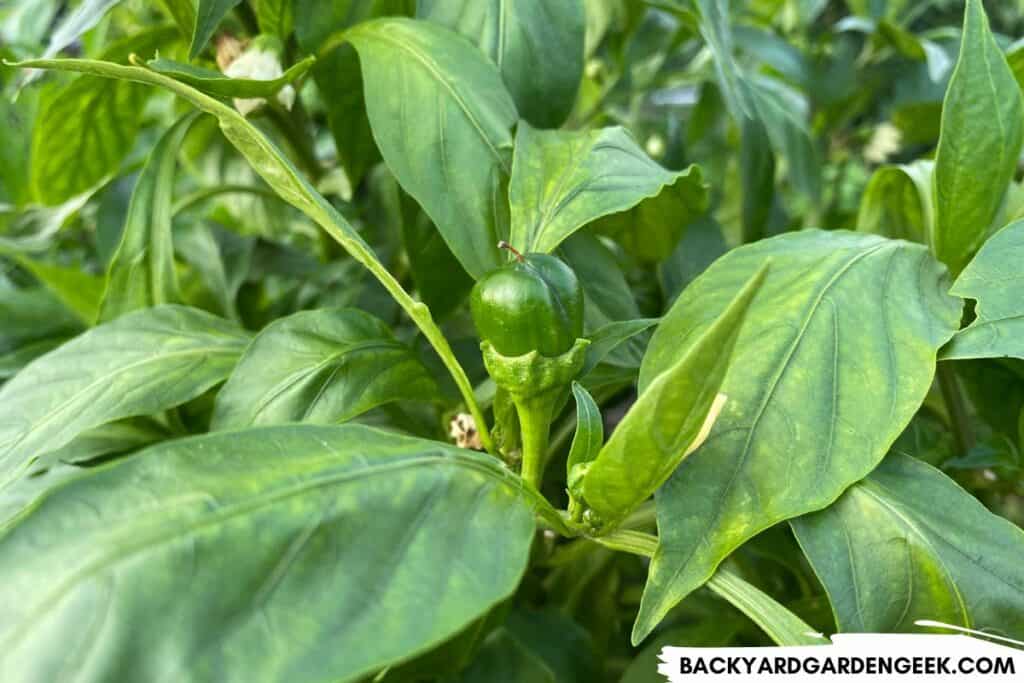
This is why you’ve got to get rid of the aphids first if you want to rid your pepper plants of ants.
I’ve written quite a few articles about aphid infestations, so before going further, check out these articles if you’d like to take a deeper dive into the subject:
- Where Do Aphids Come From? Things to Consider
- Are Aphids Invasive?
- Can You See Aphids on Plants? Spotting Early Infestations
- 21 Plants That Aphids Love to Attack + How to Stop Them
- Are Aphids Harmful to Humans? Things You Should Know
- Are Aphids Pollinators? A Brief Guide to Pollinating Pests
- Can Plants Recover from Aphids? Tips to Save Your Plants
- Will Aphids Spread to Other Plants?
How Do I Get Rid of Ants on My Pepper Plants?
First, let’s look at some of the best, natural ways to get rid of ants on paper plants. I’ll then talk more about aphids and what’s causing them to infest your pepper plants before focusing on how to get rid of both.
I’ve written about natural ways to get rid of ants, especially for cat-friendly households, but here are 5 simple suggestions for getting rid of ants:
1. Borax and Powdered Sugar
Mix one part borax (20 Mule Team natural laundry detergent booster) with three parts powdered sugar. Place it around your yard or near ant hills to reduce the ant population. When the ants carry the mixture back to their colony, feed it to their young, and eat it themselves, they will die.
2. Diatomaceous Earth (food grade)
Scatter around the pepper plants to discourage ants and directly on them to kill them. Do not apply when your pepper plants are in bloom, as it will kill the pollinators.
3. Lemon Juice
Dilute 1 part fresh lemon juice with 1 part water and spray liberally to destroy the ant’s scent trails.
4. Vaseline
Smear Vaseline along the trunk of your pepper plants. Both ants and aphids will have difficulty climbing up the Vaseline.
The vaseline trick is rather odd-sounding at first, but it’s super simple to do. Simply get some Vaseline on your fingers, then smear it around the main stalk of your plant. The downside is that Vaseline has to be reapplied regularly to maintain its effects.
5. Vinegar
Mix 1 part distilled white vinegar with 1 part water and spray to repel ants and eradicate their trails.
As we’ll discuss below, ants are going to go where the aphids are, but here are 5 additional steps you can take to ensure your garden beds don’t become ant-friendly environments:
- Prune trees and trim bushes in the areas surrounding your garden to discourage ants from living in them.
- Remove tall weeds growing around your garden to make it easier to quickly locate and prevent ant colonies.
- Regularly water your pepper plants and keep the soil lightly moist. Since ants like to build their nests in dry soil, this will serve as a preventative measure.
- Grow plants around the perimeter of your garden or the periphery of your raised gardens that ants don’t particularly like, such as lavender, mint, tansy, thyme, rosemary, and catnip.
- Plant garlic as a companion plant next to your peppers. But remember that pepper plants can often grow somewhat tall, so be sure to plant the garlic in areas around your plants that get plenty of sun.
Long story short, you don’t want to try and remove all ants from your garden. After all, they’re beneficial for soil aeration and pest control.
The goal instead is balance. If your plants are covered in ants, you’ve got a highly visible problem (the ants) and likely a less visible problem as well (such as aphids).
Why Do I Have So Many Ants in My Garden?
Ants are one of the most numerous insects on the planet. However, there won’t be an overabundance of them in your garden unless they have a reason to be there.
If you’ve noticed lots of ants on your pepper plants, then there’s a good chance you have an aphid infestation, so let’s talk a bit more about aphids.
According to the University of Minnesota Extension, aphids are “small, 1/16-to 1/8-inch long, are pear-shaped, and can range in color from green, black, red, yellow, brown or gray.” They have two antennae in front and two tail pipes (cornicles) sticking out from the end of their abdomen.
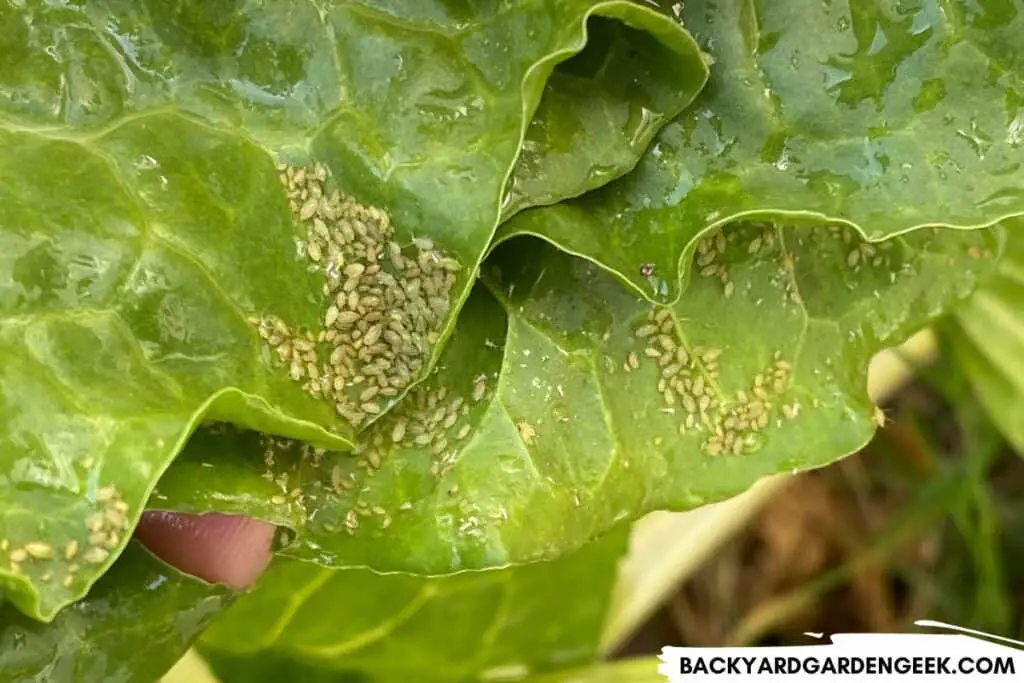
I’ve written about various colored aphids, so check out these articles if you want to read more about them:
- Are Aphids Black? How to Identify and Stop Black Aphids
- Are Aphids Green? How to Recognize and Kill Green Aphids
- Are Aphids Red? Identifying and Stopping Red Aphids
- Are Aphids White? How to Spot and Get Rid of White Aphids
- Are Aphids Yellow? How to Identify and Repel Yellow Aphids
Aphids are tiny, but luckily for us gardeners, they tend to congregate in small masses.
Take a close look at your pepper plants (especially under the leaves), and if you see any areas that look like they’ve got speckled spots on them, look very closely because those are probably aphids.
Here are other telltale signs of aphids:
- Damaged fruit
- Galls forming on the roots and leaves
- Leaves or stems covered with a sticky substance (known as honeydew)
- Misshapen, curling, stunted, or yellowing leaves
- Sooty mold on the plant’s leaves
Aphids feed by inserting their mouthparts into phloem vessels, which are vascular plant tissue that conducts foods made in the leaves during photosynthesis. Once they do so, they slowly suck out the plant’s sap.
The aphids extract what they need (nitrogen from the plants) and excrete the honeydew as a byproduct that ants love to gather for food.
Simply put, ants and aphids have a symbiotic relationship.
The ants protect the aphids from predators while they “milk” the aphid’s waste for themselves.
These articles will provide lots of detail for anyone interested in learning more:
- Do Aphids Attract Ants?
- Do Ants Eat or Kill Aphids? 6 Environmental Factors
- Do Ants Make Aphids Worse? 7 Behaviors to Understand
- Why Do Ants Protect Aphids? 7 Things You Should Know
In fact, ants love aphid honeydew so much that they’ll carry aphids to new plants, help shelter aphids, and occasionally take them into their colony to protect them during cold winter months. They’ll even transport aphid eggs when they move to a new colony.
In other words, if you see ants and aphids on your pepper plants, it’s best to deal with the aphid problem immediately.
But don’t panic. Even if you notice a heavy aphid infestation on your plants, aphids are one of the easiest pests to get rid of if you attack them aggressively and consistently.
Here’s what to do if you see a light infestation: Blast your pepper plants with water from your garden hose.
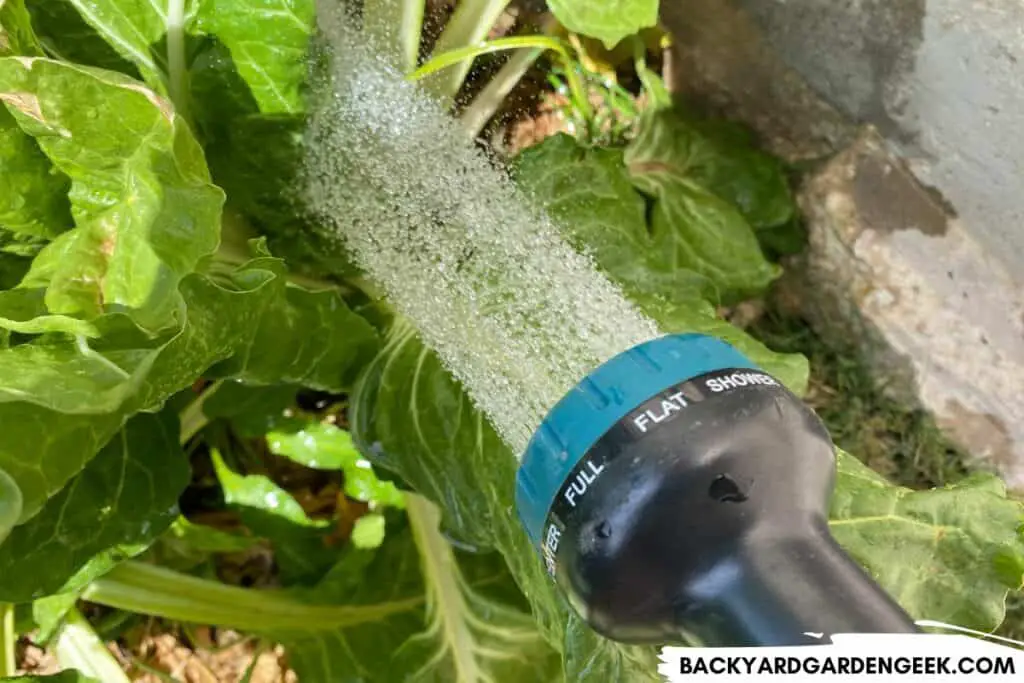
Doing so will often wash many aphids away, making it difficult for them to find their way back to your plants.
While ants are extremely intelligent and leave scent trails to find their way back to food sources, aphids aren’t and don’t. Once you’ve blasted them off your plants, they’re most likely going to die shortly thereafter.
Blasting them with water is always my first defense against aphids, whether in my garden or on my houseplants. But please be warned: You’ve got to blast the plant since aphids are really good at holding on in the face of water pressure.
If you’re concerned about damaging your plants, you might want to consider the options listed below.
When it comes to heavy aphid infestations, blasting them with water will never be enough. You’ve got to get much more aggressive.
Luckily, you can make a simple DIY soapy water spray that’s very effective against aphids. Here’s what you do:
- Add water to a 1- or 2-gallon spray bottle. You can use a 1/2 gallon spray bottle, but for soapy water sprays, I prefer making a larger batch since it’ll keep just fine for repeated uses.
- Add 4-5 teaspoons of liquid castile soap per gallon of water. My favorite soap is Dr. Bronner’s Peppermint Castile Soap. I buy the largest bottles possible since it’s usually cheaper to buy them in bulk.
- Spray the aphid-infested plants with your soapy water spray.
- Wait 1 hour, then blast those same plants with your water hose. The soapy solution smothers the aphids and makes it hard for them to hold on to the plants. If the soapy water spray doesn’t kill them, the water blasts will.
- Reapply every 1-2 days as a preventive measure until you see no more aphids on your plants.
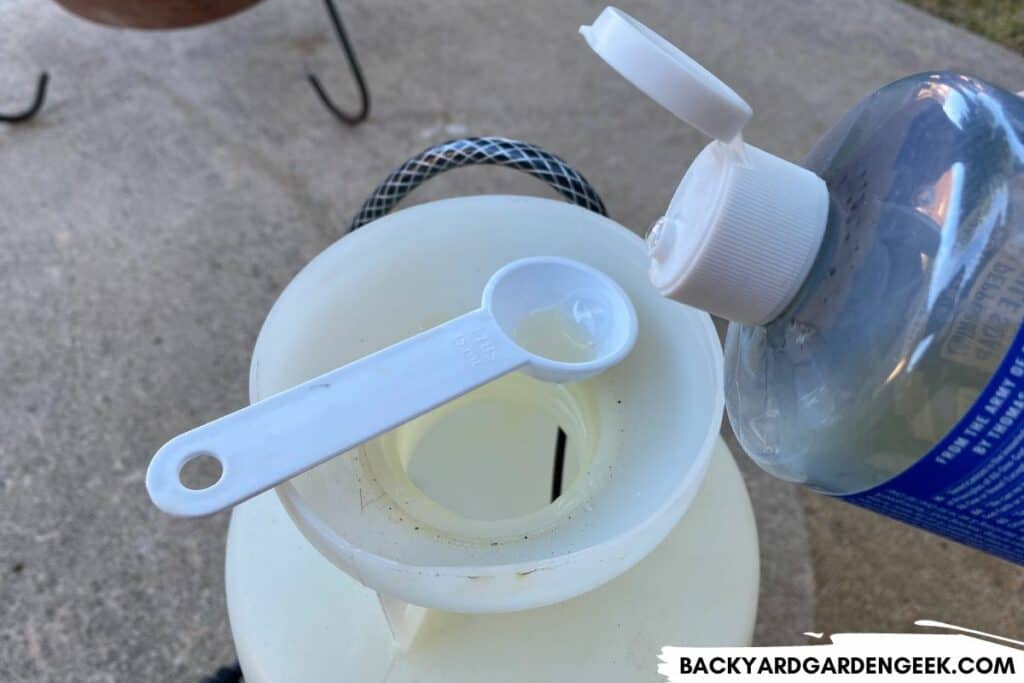
One word of warning: It’s always best to apply your soapy water sprays in the early evening, preferably right before the sun sets. If you spray your plants with a soapy water spray on a hot summer day, you might damage them.
Here are 6 more natural ways to get rid of aphids:
1. Crush Them Between Your Fingers
I wouldn’t do this barehanded because you’ll just get sticky goo on your hands, but I’ve crushed aphids plenty of times while wearing work gloves.
Just to be clear, this won’t solve your aphid problem, but if you’re lucky enough to notice aphids when they first appear on a plant, crushing them might be all you need to do to keep the infestation from growing.
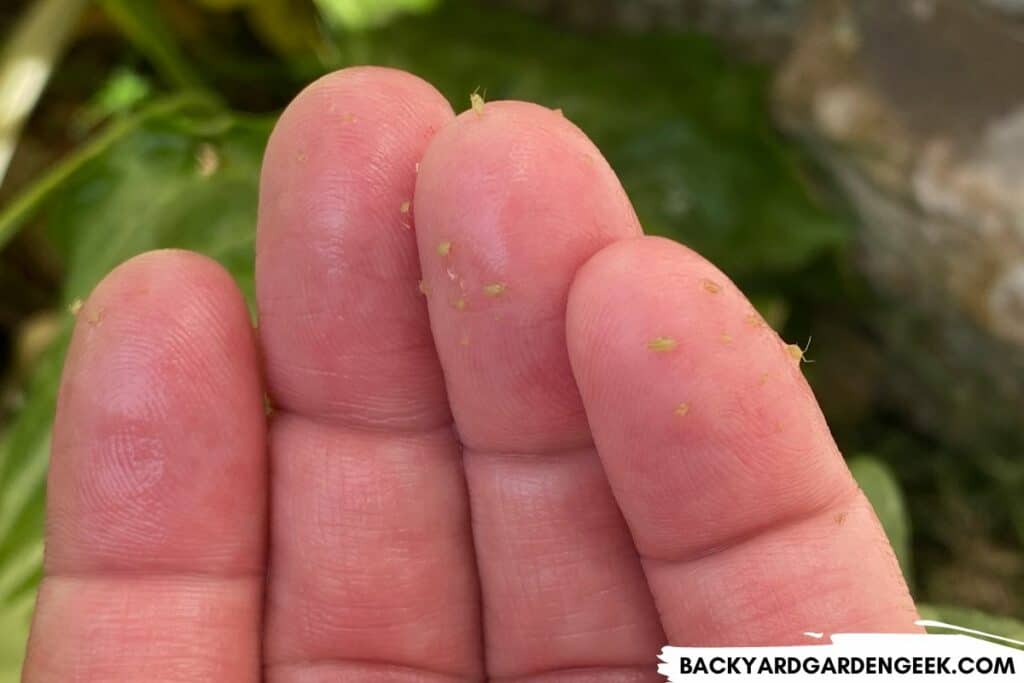
The easiest way to crush them is to use a pinching motion with two fingers. You’ll smash aphids on both sides of the leaves or stems while ensuring that you don’t harm your plant in any way.
2. Cayenne Pepper Spray
Mix 1 quart water with 1 teaspoon liquid dish soap and a pinch of cayenne pepper in a spray bottle and spray your plants thoroughly.
Don’t forget to spray the underside of the leaves and around the base of the plant.
3. Get Help from Ladybugs
You can buy bags of live ladybugs online or at your local garden center and scatter them on or around your pepper plants. Some people even hang special ladybugs houses nearby to hopefully attract ladybugs.
Here’s the thing about ladybugs and other aphid-eating bugs: They’ll definitely help with your aphid infestation, but they might not kill off all of the aphids, which means you’ve got 2 options.
Option 1: Let the ladybugs work and don’t interfere. I did this once, and everything turned out fine. The aphids on my shishito pepper plants eventually disappeared as the ladybugs arrived in full force and took care of my problem.
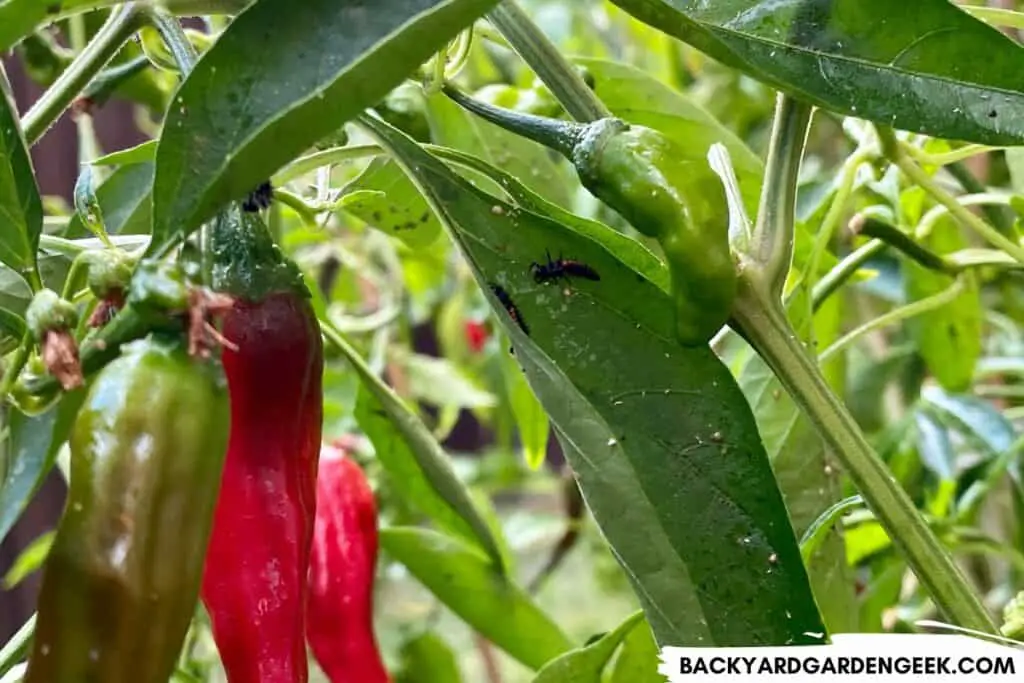
Option 2: Use an aphid-killing treatment. One summer, I had aphids in my spinach. Ladybugs were there too, but they didn’t seem to be helping much (possibly because there were too few of them).
The aphids got worse and worse, so I finally decided to spray my plants. I likely killed off some beneficial ladybugs, but I felt I had no choice since the aphid infestation was getting out of hand.
I ended up throwing away several heavily infested plants because the aphids had already done so much damage to them that they weren’t worth saving.
4. Insecticidal Soap Spray
Readily available at your local garden center and big box stores, insecticidal soap spray is just as effective as liquid soap spray, if not more so. However, much like other sprays, it needs to make direct contact with the aphids for it to work
Take care to read the label when choosing insecticidal soaps because there are several kinds, and some are more harmful to beneficial insects than others.
I really like Safer Brand Insect Killing Soap. It’s made with potassium salts, so it’s similar to dish soap, but it works by dehydrating insect exoskeletons. Whenever this happens, the insects die off quicker because they can no longer maintain their biological processes.
You can also find insecticidal soaps that are made with pyrethrins, but you’ll want to be careful with these since they’ll kill a wider variety of insects, including pollinators.
5. Neem Oil
I’m a big fan of neem oil since it’s an all-purpose organic insecticide that contains natural compounds that disrupt insect hormones and short circuit their biological processes, causing feeding and reproduction problems in aphids.
Neem oil won’t instantly kill your aphids like soapy water sprays, but it’ll gradually reduce their numbers and thus kill them off.
Be sure to follow all package instructions: Dilute the neem oil with water and some liquid soap, which will help it stick to plants.
For extreme aphid infestations, follow the schedule I’ve laid out in these articles on helping plants recover from spider mites and using neem oil to kill off spider mites. I use the same schedule if I’ve got an out-of-control aphid infestation in my garden.
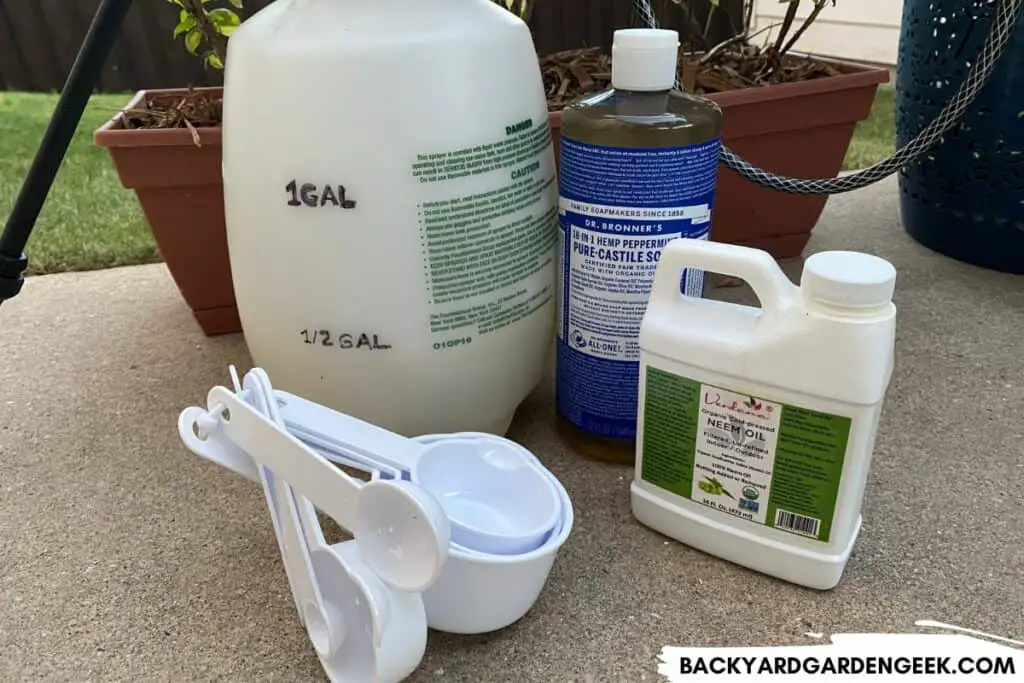
A quick note about neem oil: It can burn the leaves of your pepper plants, so be sure to apply it later in the day (preferably as the sun is setting) so that it completely dries before things warm up the following day.
I highly recommend learning more about neem oil since it’s an incredible addition to your pest management arsenal. Here are some related articles you might find interesting:
- What Bugs Does Neem Oil Repel and Get Rid Of?
- Why Do Insects Hate Neem Oil? 12 Secrets to Its Success
- Neem Oil Plant Burn: Why It Happens + How to Avoid It
- Is Neem Oil Safe on Fruits and Vegetables? Food for Thought
- How Can I Make Neem Oil More Effective? My 10-Step Process
- How Long Does It Take for Neem Oil to Kill Bugs?
When it comes to keeping ants off of pepper plants, here’s a list of things that haven’t worked well for me, although you’ll find them recommended on gardening websites:
- Artificial Sweeteners: Supposedly, artificial sweeteners kill ants. But I prefer to keep my soil as healthy as possible, so putting anything artificial on the soil doesn’t work for me.
- Blowing Them Off: You might be able to blow off a few aphids with a leaf blower, but I don’t recommend doing so. You’ll probably just damage your plants in the process.
- Cinnamon Powder, Sticks, or Essential Oil: Sprinkling cinnamon products on the soil or dusting your pepper plants with them doesn’t repel ants.
- Growing Flowers Nearby: Flowers contain nectar, one of the primary food sources for ants, and people like planting them in and around gardens as trap crops designed to keep bad bugs away from garden veggies. For spider mites, that works just fine, as I’ve noted in this article on planting marigolds as trap plants. But guess who else loves flowers: aphids. And where aphids are, ants will follow.
- Putting Double-Sided Sticky Tape on Plants: This will technically work to some extent, but it’s not a great plan since, depending on the time of year, aphids will give birth to flying aphids that can extend the infestation from plant to plant, whether or not there’s sticky tape on them. And don’t even try to remove the tape. You’ll just damage the plant if you do.
I hope this article has given you lost of information when it comes to tackling the pests that are in your garden.
Long story short, if you locate the source of your problem and act quickly to stop any emerging infestations, your pepper plants will be that much more likely to produce lots of beautiful peppers for you and your family.
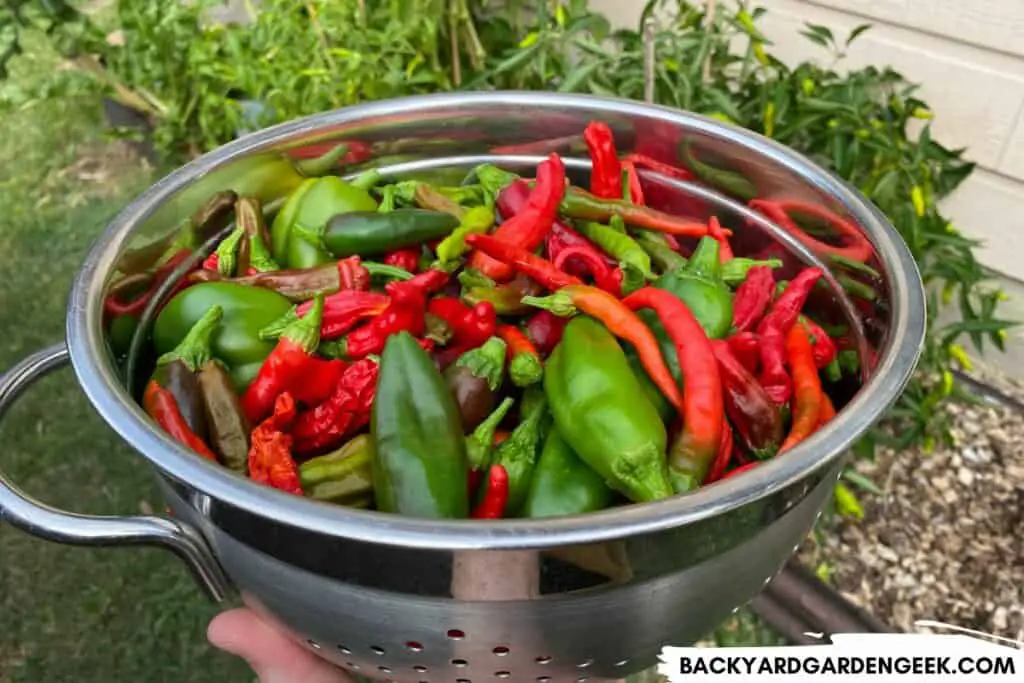
Can Ants Pollinate Peppers?
Technically, ants can pollinate pepper plants, but they’re not pollinators per se, as I’ve explained in this article on pollinating pests.
The good news is that pepper plants are self-pollinating, meaning a single flower can set fruit by itself. The male part of the flower (stamen) will release pollen onto the female part (carpel), which results in pollination and fruit set.
While ants can technically pollinate pepper plants, they’re aren’t necessary for pollination, and you shouldn’t allow them to remain on or around your pepper plants since there’s a good chance they’re protecting the aphids by killing off beneficial predators.
Further Reading
If you’d like to learn more about some of the topics I’ve discussed above, here are a few articles that might be of interest:
